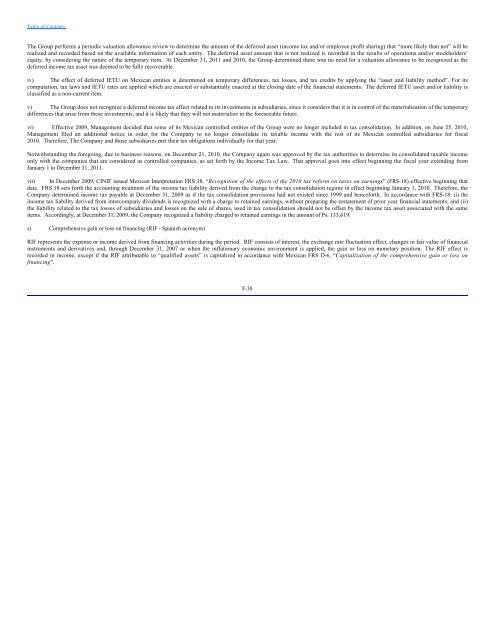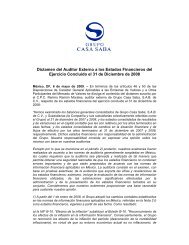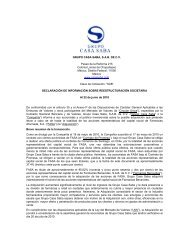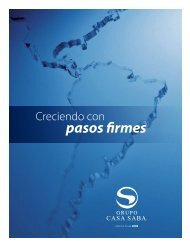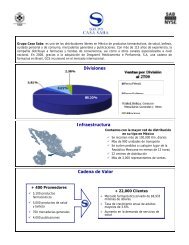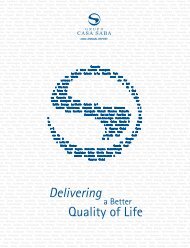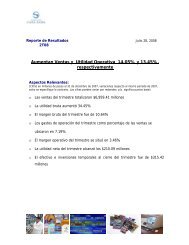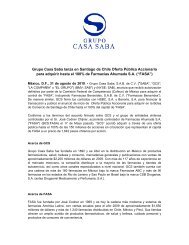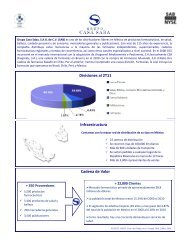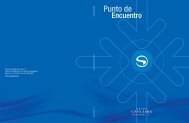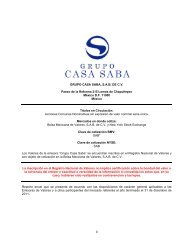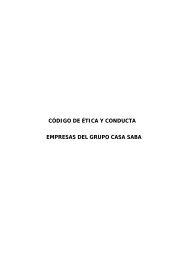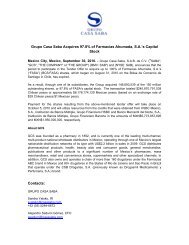FORM 20-F Grupo Casa Saba, S.A.B. de C.V.
FORM 20-F Grupo Casa Saba, S.A.B. de C.V.
FORM 20-F Grupo Casa Saba, S.A.B. de C.V.
Create successful ePaper yourself
Turn your PDF publications into a flip-book with our unique Google optimized e-Paper software.
Table of Contents<br />
The Group performs a periodic valuation allowance review to <strong>de</strong>termine the amount of the <strong>de</strong>ferred asset (income tax and/or employee profit sharing) that “more likely than not” will be<br />
realized and recor<strong>de</strong>d based on the available information of each entity. The <strong>de</strong>ferred asset amount that is not realized is recor<strong>de</strong>d in the results of operations and/or stockhol<strong>de</strong>rs’<br />
equity, by consi<strong>de</strong>ring the nature of the temporary item. At December 31, <strong>20</strong>11 and <strong>20</strong>10, the Group <strong>de</strong>termined there was no need for a valuation allowance to be recognized as the<br />
<strong>de</strong>ferred income tax asset was <strong>de</strong>emed to be fully recoverable.<br />
iv) The effect of <strong>de</strong>ferred IETU on Mexican entities is <strong>de</strong>termined on temporary differences, tax losses, and tax credits by applying the “asset and liability method”. For its<br />
computation, tax laws and IETU rates are applied which are enacted or substantially enacted at the closing date of the financial statements. The <strong>de</strong>ferred IETU asset and/or liability is<br />
classified as a non-current item.<br />
v) The Group does not recognize a <strong>de</strong>ferred income tax effect related to its investments in subsidiaries, since it consi<strong>de</strong>rs that it is in control of the materialization of the temporary<br />
differences that arise from these investments, and it is likely that they will not materialize in the foreseeable future.<br />
vi) Effective <strong>20</strong>09, Management <strong>de</strong>ci<strong>de</strong>d that some of its Mexican controlled entities of the Group were no longer inclu<strong>de</strong>d in tax consolidation. In addition, on June 25, <strong>20</strong>10,<br />
Management filed an additional notice in or<strong>de</strong>r for the Company to no longer consolidate its taxable income with the rest of its Mexican controlled subsidiaries for fiscal<br />
<strong>20</strong>10. Therefore, The Company and those subsidiaries met their tax obligations individually for that year.<br />
Notwithstanding the foregoing, due to business reasons, on December 21, <strong>20</strong>10, the Company again was approved by the tax authorities to <strong>de</strong>termine its consolidated taxable income<br />
only with the companies that are consi<strong>de</strong>red as controlled companies, as set forth by the Income Tax Law. That approval goes into effect beginning the fiscal year extending from<br />
January 1 to December 31, <strong>20</strong>11.<br />
vii) In December <strong>20</strong>09, CINIF issued Mexican Interpretation FRS 18, “Recognition of the effects of the <strong>20</strong>10 tax reform on taxes on earnings” (FRS-18) effective beginning that<br />
date. FRS 18 sets forth the accounting treatment of the income tax liability <strong>de</strong>rived from the change to the tax consolidation regime in effect beginning January 1, <strong>20</strong>10. Therefore, the<br />
Company <strong>de</strong>termined income tax payable at December 31, <strong>20</strong>09 as if the tax consolidation provisions had not existed since 1999 and henceforth. In accordance with FRS-18: (i) the<br />
income tax liability <strong>de</strong>rived from intercompany divi<strong>de</strong>nds is recognized with a charge to retained earnings, without preparing the restatement of prior year financial statements; and (ii)<br />
the liability related to the tax losses of subsidiaries and losses on the sale of shares, used in tax consolidation should not be offset by the income tax asset associated with the same<br />
items. Accordingly, at December 31, <strong>20</strong>09, the Company recognized a liability charged to retained earnings in the amount of Ps. 133,619.<br />
s) Comprehensive gain or loss on financing (RIF - Spanish acronym)<br />
RIF represents the expense or income <strong>de</strong>rived from financing activities during the period. RIF consists of interest, the exchange rate fluctuation effect, changes in fair value of financial<br />
instruments and <strong>de</strong>rivatives and, through December 31, <strong>20</strong>07 or when the inflationary economic environment is applied, the gain or loss on monetary position. The RIF effect is<br />
recor<strong>de</strong>d in income, except if the RIF attributable to “qualified assets” is capitalized in accordance with Mexican FRS D-6, “Capitalization of the comprehensive gain or loss on<br />
financing”.<br />
F-30


